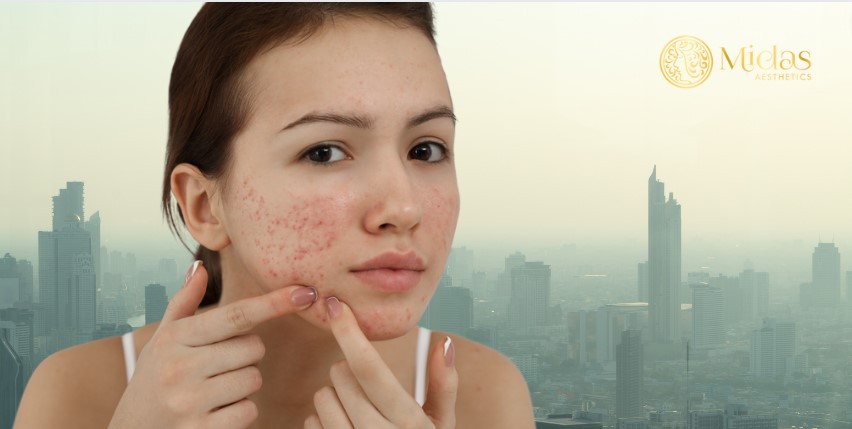
Acne, Mood Swings, and Irregular Periods: Dietary Solutions That Work for Teens

Acne, Mood Swings, and Irregular Periods: Dietary Solutions That Work for Teens
Puberty is a time of rapid change, both physically and emotionally. For many teens, this period brings not only excitement about growing independence but also challenges in the form of acne, mood swings, and irregular periods. These issues are often linked to hormonal fluctuations that naturally occur during adolescence. While these changes are normal, diet plays a significant role in how a teen experiences them. By understanding the connection between nutrition and hormones, teens can take practical steps to improve their overall well-being during these formative years.
Understanding the Hormonal Changes in Teens

The root of acne, mood swings, and irregular periods in teens lies in the hormonal shifts of puberty. The hypothalamus in the brain signals the pituitary gland to release hormones like luteinizing hormone (LH) and follicle-stimulating hormone (FSH). These hormones stimulate the gonads, ovaries in girls and testes in boys, to produce sex hormones, including estrogen, progesterone, and testosterone.
- In girls, fluctuations in estrogen and progesterone regulate the menstrual cycle. Irregular periods can occur when the balance of these hormones is disrupted.
- In boys, increasing testosterone influences mood, muscle development, and the appearance of body hair.
- In both boys and girls, hormonal changes can increase oil production in the skin, leading to acne.
Mood swings are also closely linked to these hormonal changes. The neurotransmitters in the brain, such as serotonin and dopamine, respond to hormone levels. Sudden shifts can affect a teen’s mood, energy levels, and emotional resilience.
The Role of Diet in Hormonal Health

Nutrition is a powerful tool for regulating hormones and supporting the body’s natural processes during puberty. Certain foods can help stabilize hormones, reduce inflammation, and improve skin health, while others may exacerbate acne, mood swings, and menstrual irregularities.
Foods That Help Balance Hormones
1. Protein-Rich Foods
Protein is crucial for growth, tissue repair, and hormone production. Teens should include sources such as eggs, lean meat, fish, beans, and dairy in their daily meals. Protein helps maintain stable blood sugar levels, which can reduce mood swings and prevent spikes in androgen hormones that worsen acne.
2. Healthy Fats
Fats are essential for hormone production. Omega-3 fatty acids, found in salmon, chia seeds, flaxseeds, and walnuts, support anti-inflammatory processes and help regulate mood. Monounsaturated fats from avocado, olive oil, and nuts also promote hormone balance and overall skin health.
3. High-Fiber Foods
Fruits, vegetables, and whole grains provide fiber, which aids in the elimination of excess estrogen from the body. A diet rich in fiber supports healthy digestion and can help regulate menstrual cycles in teens.
4. Vitamin and Mineral-Rich Foods
Key nutrients such as zinc, magnesium, and vitamin B6 play a role in hormone synthesis and mood regulation. Zinc, found in pumpkin seeds, lentils, and nuts, is especially important for skin health and acne management. Magnesium supports neurotransmitter function, helping with mood stability. Vitamin B6, present in bananas, spinach, and poultry, is essential for regulating progesterone levels.
5. Probiotic Foods
A healthy gut microbiome supports the metabolism of hormones. Probiotic-rich foods like yogurt, kefir, and fermented vegetables can improve digestion and aid in balancing hormones naturally.
Foods and Habits to Limit
1. High-Sugar and Processed Foods
Excess sugar and refined carbohydrates can lead to insulin spikes, which increase androgen production and worsen acne. Candy, soda, white bread, and pastries should be limited.
2. Dairy Products in Excess
Some teens find that large amounts of dairy exacerbate acne, possibly due to hormones in milk. Moderation or choosing low-fat, hormone-free options may help.
3. Caffeine
High caffeine intake can affect sleep quality and elevate stress hormones, contributing to mood swings. Teens should monitor energy drink, coffee, and soda consumption.
4. Highly Processed Snacks
Chips, fast food, and packaged snacks can increase inflammation in the body, which may worsen acne and disrupt hormone balance.
Managing Acne Through Diet
Acne in teens is primarily caused by excess oil production and inflammation triggered by hormonal changes. Diet can help manage these factors effectively:
- Increase Anti-Inflammatory Foods: Tomatoes, leafy greens, berries, turmeric, and fatty fish can reduce skin inflammation.
- Support Detoxification: Cruciferous vegetables like broccoli, cauliflower, and cabbage help the liver metabolize excess hormones that may contribute to acne.
- Hydration: Drinking enough water helps flush out toxins and maintain healthy skin hydration.
Stabilizing Mood Swings with Nutrition
Mood swings during puberty can feel intense for teens, but dietary choices can influence neurotransmitter function:
- Complex Carbohydrates: Oats, brown rice, quinoa, and sweet potatoes support steady energy levels and serotonin production.
- Magnesium-Rich Foods: Nuts, seeds, and leafy greens can reduce irritability and improve sleep quality.
- Protein at Every Meal: Ensures stable blood sugar levels, which prevents sudden mood crashes.
- Omega-3 Fatty Acids: Improve brain function and reduce symptoms of depression or anxiety.
Supporting Regular Periods with Diet
Irregular periods are common in teens, especially in the first few years after menarche. Nutrition can help regulate cycles:
- Maintain Healthy Weight: Extreme underweight or overweight conditions can disrupt estrogen and progesterone balance.
- Iron-Rich Foods: Lean meats, beans, and leafy greens replenish iron lost during menstruation.
- Calcium and Vitamin D: Support bone health, especially when menstrual cycles are irregular.
- Reduce Inflammatory Foods: Limiting sugar, fried foods, and processed snacks helps maintain hormonal balance.
Lifestyle Habits to Complement Diet
Diet alone is not enough. Functional medicine emphasizes a holistic approach that combines nutrition with lifestyle habits:
1. Exercise: Regular physical activity helps balance hormones, reduce stress, and improve mood. Activities like swimming, cycling, yoga, or team sports are ideal for teens.
2. Sleep: Teens need 8–10 hours of sleep per night. Adequate sleep supports growth hormone release, mood regulation, and hormone balance.
3. Stress Management: Mindfulness, meditation, journaling, and spending time outdoors can help reduce cortisol levels and stabilize mood.
4. Gut Health: Maintaining a healthy digestive system through probiotics, prebiotic-rich foods, and hydration supports hormonal metabolism.
Functional Medicine Approach
Functional medicine looks at root causes of hormonal imbalance rather than just symptoms. For teens struggling with acne, mood swings, or irregular periods, functional medicine practitioners may:
- Assess nutrient deficiencies and recommend personalized supplementation
- Evaluate diet and gut health to optimize hormone metabolism
- Provide lifestyle guidance tailored to stress management and sleep hygiene
- Use natural, evidence-based approaches to support regular menstrual cycles and skin health
Practical Tips for Teens
- Eat three balanced meals with protein, healthy fats, and complex carbs.
- Snack on nuts, fruits, or yogurt instead of candy or chips.
- Drink plenty of water throughout the day.
- Incorporate colorful vegetables into every meal.
- Limit processed and sugary foods.
- Maintain a consistent sleep schedule.
- Stay active with sports, yoga, or walking.
When to Seek Medical Advice
While diet and lifestyle changes can significantly help, teens should consult a healthcare professional if they experience:
- Severe acne that doesn’t improve with proper care
- Extremely irregular or missed periods after the first two years of menarche
- Persistent mood swings, anxiety, or depression
- Sudden changes in weight or growth patterns
- Early intervention ensures proper evaluation and treatment if there is an underlying hormonal imbalance or medical condition.
Conclusion
Puberty is a transformative period that brings both exciting growth and challenges such as acne, mood swings, and irregular periods. For teens, diet and lifestyle are powerful tools to support hormone balance and overall well-being. By focusing on nutrient-rich foods, minimizing processed and sugary items, staying active, and managing stress, teens can navigate this stage with more confidence and healthier bodies.
With a holistic approach that includes both diet and functional medicine strategies, teens can experience smoother hormonal transitions, better skin, improved mood, and more regular cycles. Understanding and supporting the body during these formative years lays the foundation for long-term health and well-being.
Book your appointment today at Midas Wellness Hub.



